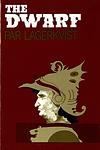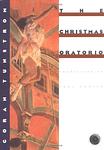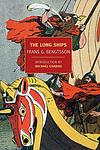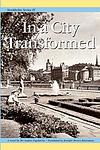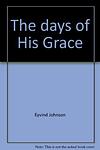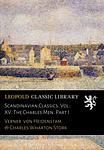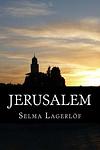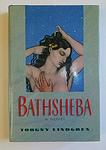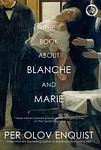The Greatest Swedish "Historical fiction" Books of All Time
Click to learn how this list is calculated.
This list represents a comprehensive and trusted collection of the greatest books. Developed through a specialized algorithm, it brings together 300 'best of' book lists to form a definitive guide to the world's most acclaimed books. For those interested in how these books are chosen, additional details can be found on the rankings page.
Genres
Historical fiction is a genre of literature that combines fictional stories with real historical events, settings, and characters. These books often take place in a specific time period and are based on research and factual information, but also include imaginative elements to create a compelling narrative. Historical fiction allows readers to experience the past in a unique and engaging way, while also providing insight into the social, cultural, and political issues of the time.
Countries
Date Range
Reading Statistics
Click the button below to see how many of these books you've read!
Download
If you're interested in downloading this list as a CSV file for use in a spreadsheet application, you can easily do so by clicking the button below. Please note that to ensure a manageable file size and faster download, the CSV will include details for only the first 500 books.
Download-
1. Barabbas by Par Lagerkvist
This novel tells the story of Barabbas, the man who was pardoned instead of Jesus Christ, according to the New Testament. After being released, Barabbas grapples with his newfound freedom and the guilt of being spared at the expense of Jesus. As he witnesses the rise of Christianity and the profound impact Jesus' teachings have on those around him, he struggles with his own beliefs and the meaning of his existence. The narrative explores themes of faith, redemption, and the human condition.
-
2. The Dwarf by Par Lagerkvist
"The Dwarf" is a dark, philosophical novel set in the Italian Renaissance, narrated by a malevolent court dwarf who serves a prince. The dwarf is a symbol for the darker side of humanity, embodying all the malice, deceit, and manipulation that one can possess. His actions and viewpoint provide a cynical commentary on human nature and the moral complexities of power, war, and love. The novel explores themes of good and evil, faith and doubt, and the destructive side of human nature.
-
3. The Christmas Oratorio by Göran Tunström
"The Christmas Oratorio" is a poignant story set in a small Swedish town, revolving around a boy who loses his mother and his relationship with his silent, grieving father. The narrative is deeply embedded in music, specifically Bach's Christmas Oratorio, which becomes a source of solace for the boy. The tale is a rich tapestry of love, loss, and the healing power of music, exploring the deep emotional bonds between father and son, and the transformative power of art.
-
4. Simon and the Oaks by Marianne Fredriksson
"Simon and the Oaks" is a poignant tale set against the backdrop of World War II, depicting the life of a young Swedish boy, Simon, who comes from a working-class family but dreams of a world beyond his own. His life changes when he befriends Isak, a boy from a wealthy Jewish family fleeing from Nazi Germany. The book explores their friendship, the stark contrast between their worlds, their shared love for literature and music, and the impact of war on their lives. It also delves into themes of identity, love, loss, and the enduring power of human spirit.
-
5. The Long Ships by Frans G. Bengtsson
"The Long Ships" is a historical fiction novel centering around the Viking era. The story follows the adventures of a young Viking named Red Orm who is kidnapped by other Vikings, becomes a slave, then a chieftain's henchman, a merchant, explorer, and a soldier. His adventures take him from his native Sweden to Spain, England, Denmark, and Ireland. The novel explores the political, religious, and cultural landscapes of the era, providing a detailed and engaging portrayal of the Viking world.
-
6. The Emigrants by Vilhelm Moberg
"The Emigrants" is a historical novel that follows the journey of a Swedish farming family who, driven by poverty and religious persecution, decide to emigrate to America in the mid-19th century. The narrative explores their struggles and hardships, from the decision to leave their homeland, the arduous journey across the Atlantic, to their eventual settlement in Minnesota. The book provides a profound and realistic depiction of the immigrant experience, highlighting the courage, determination, and resilience of the emigrants.
-
7. Gösta Berling's Saga by Selma Lagerlöf
The novel tells the story of Gösta Berling, a defrocked minister who becomes a cavalier at Ekeby Manor in Värmland, Sweden. His journey is filled with a series of adventures, romantic encounters, and battles with the forces of nature and the changing seasons. Throughout the narrative, the themes of redemption, love, and the enduring spirit of community are explored. Gösta's character, along with the other cavaliers and the people of Värmland, represents the struggle between good and evil, and the power of love and redemption.
-
8. The Book-Dealer Who Ceased Bathing by Fritiof Nilsson Piraten
"The Book-Dealer Who Ceased Bathing" is a humorous and engaging story about a quirky bookseller who decides to stop bathing. His unusual decision leads to a series of comical and unexpected consequences, as he grapples with the reactions of his customers, neighbors, and the local community. The book cleverly explores themes of individuality, societal expectations, and the often absurd nature of human behavior.
-
9. Stockholm series by Per Anders Fogelström
The "Stockholm series" is a historical fiction saga that spans over a century, chronicling the lives of various generations of families living in Stockholm, Sweden. The narrative begins in the mid-19th century and ends in the 1960s, providing a detailed and vivid picture of the city's transformation during this period. The series explores themes of love, poverty, wealth, class struggle, and social change, offering an immersive view of Stockholm's history through the personal stories of its characters.
-
10. The Days of His Grace by Eyvind Johnson
"The Days of His Grace" is a historical novel set in the 14th century, during the time of the Hundred Years' War between France and England. The narrative follows a Swedish nobleman who becomes involved in the political and religious conflicts of the era, while also dealing with his own personal struggles and relationships. The book is a complex exploration of power, faith, and the human condition, reflecting on the moral and ethical dilemmas faced by individuals in times of war and upheaval.
-
11. The Emperor of Portugallia by Selma Lagerlöf
"The Emperor of Portugallia" is a poignant tale of a poor Swedish farmer who loses his sanity after his beloved daughter leaves home to work in the city. He retreats into a fantasy world where he is the Emperor of Portugallia, and his daughter is the Empress. Despite the ridicule and scorn he faces from his community, he clings to his delusions, finding comfort and solace in them. The story is a profound exploration of love, loss, and the power of the human mind to create alternate realities as a coping mechanism.
-
12. The Charles Men by Verner von Heidenstam
This historical novel offers a panoramic view of Sweden during the Great Northern War, focusing on the reign of Charles XII and the profound impact of his military campaigns across Europe. Through a series of vividly drawn characters, both real and fictional, the narrative explores themes of patriotism, the futility of war, and the clash between old and new societal values. The book delves into the personal and political challenges faced by those who lived through this tumultuous period, presenting a rich tapestry of heroism, tragedy, and the enduring human spirit. Its detailed portrayal of 17th and 18th-century Scandinavian life, combined with a deep reflection on the nature of leadership and national identity, makes it a significant work in the realm of historical fiction.
-
13. Jerusalem by Selma Lagerlöf
This book is a profound exploration of faith, tradition, and the quest for spiritual fulfillment, set against the backdrop of rural Sweden and the Holy Land in the late 19th century. It tells the story of a group of Swedish peasants, inspired by religious fervor, who decide to abandon their homeland and emigrate to Jerusalem to live a purer life in the city of Jesus. The narrative delves into the lives of these individuals, examining their motivations, struggles, and the impact of their decision on the loved ones they leave behind. Through its vivid portrayal of contrasting landscapes and cultures, the novel examines themes of community, belief, and the search for a spiritual homeland, making it a timeless tale of human aspiration and longing.
-
14. Samuels bok by Sven Delblanc
"Samuels bok" is a historical novel set in 18th century Sweden, focusing on the life of Samuel, a Jewish man who immigrates to Sweden to escape persecution in his home country. The book explores his journey and struggles as he navigates through a society filled with prejudice and discrimination, while also trying to maintain his faith and cultural identity. The story is a vivid portrayal of the harsh realities faced by immigrants and minorities, providing a powerful commentary on social and religious intolerance.
-
15. Bathsheba by Torgny Lindgren
"Bathsheba" is a dark and humorous tale set in a remote Swedish village plagued by a mysterious illness. The narrative follows the village's school teacher who, despite being the only one unaffected by the disease, is ostracized by the community. The arrival of a beautiful and enigmatic woman named Bathsheba stirs up the village, particularly the teacher who becomes infatuated with her. The novel explores themes of love, lust, faith, and the human condition, encapsulated in a captivating and surreal narrative.
-
16. The Löwensköld Ring by Selma Lagerlöf
The novel revolves around a cursed ring, originally stolen from the grave of a Swedish nobleman, which brings misfortune to its possessors. As the ring passes through the hands of various characters, it exposes the greed, pride, and prejudice of a community, leading to a series of tragic events. The curse of the ring seems to be inescapable until it is finally returned to its rightful place, suggesting themes of justice, retribution, and the possibility of redemption. The story intertwines the supernatural with the psychological, exploring the impact of the past on the present and the intertwining of human fate with the mystical.
-
17. Women And Appletrees by Moa Martinson
The book is a poignant exploration of the lives of rural Swedish women in the early 20th century, focusing on their struggles, relationships, and the societal expectations that confine them. Through the lens of various female characters, the narrative delves into themes of poverty, motherhood, and the pursuit of independence. The women's connection to the land and the symbolic presence of apple trees serve as a backdrop to their stories, highlighting their resilience and the cycles of life that both challenge and sustain them. The novel is a testament to the author's feminist perspective and her own experiences as a working-class woman, offering a vivid portrayal of the hardships and triumphs that shape these women's existences.
-
18. The Book about Blanche and Marie by Per Olov Enquist
The novel explores the relationship between two remarkable women: Blanche Wittman, a patient at the Salpêtrière hospital in Paris who became a renowned medium, and Marie Curie, a physicist and chemist who conducted pioneering research on radioactivity. The book delves into their friendship, their scientific collaborations, and the profound impact they had on each other's lives. It also explores the broader themes of scientific discovery, the nature of genius, and the role of women in a male-dominated society.
-
19. The Royal Physician's Visit: A Novel by Per Olov Enquist
The novel follows Johann Friedrich Struensee, a German doctor who becomes the personal physician to the mentally ill King of Denmark in the 18th century. Struensee uses his influence to enact Enlightenment-era reforms, but his affair with the Queen and his growing political power lead to his downfall. The book delves into the complexities of power, manipulation, and the human condition, all set against the backdrop of a tumultuous period in Danish history.
-
20. Hanna's Daughters by Marianne Fredriksson
The novel is an evocative family saga that spans three generations of women, exploring their lives, struggles, and interconnected stories against the backdrop of Sweden's cultural and social evolution. It delves into the experiences of Hanna and her daughter, Johanna, and granddaughter, Anna, as they navigate the complexities of their relationships, personal identities, and the shifting roles of women through the 20th century. Through their individual journeys, the book addresses themes of love, loss, and the enduring bonds of family, while also painting a vivid portrait of historical events and changes that have shaped the lives of women across generations.
Reading Statistics
Click the button below to see how many of these books you've read!
Download
If you're interested in downloading this list as a CSV file for use in a spreadsheet application, you can easily do so by clicking the button below. Please note that to ensure a manageable file size and faster download, the CSV will include details for only the first 500 books.
Download
